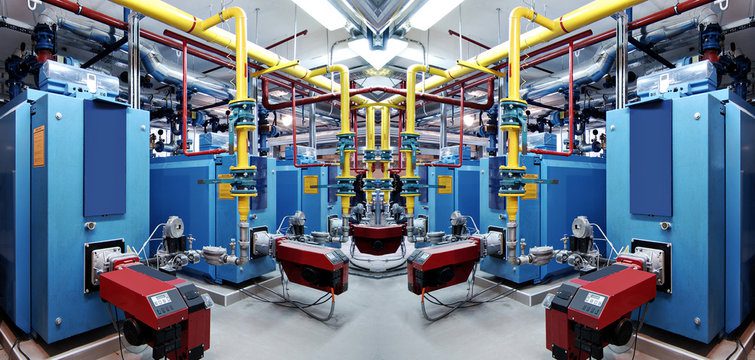In heating systems, boiler technology has been a cornerstone for many years. However, the traditional boiler systems have been known for their inefficiencies, often leading to wasted energy and higher operational costs. Today, the landscape of boiler technology is changing rapidly, with innovations aimed at enhancing efficiency, reducing energy consumption, and promoting sustainability.
One of the most significant advancements in boiler technology is the introduction of condensing boilers. Unlike traditional boilers, which lose a substantial amount of heat through the flue, condensing boilers recover heat from exhaust gases by condensing water vapour present in the flue gases.
This process improves boiler performance and leads to substantial energy savings. In fact, condensing boilers can achieve excellent efficiency of up to 98% by extracting most of the heat from the flue gases. This innovation is a leap towards the “Boiler Efficiency Paradox,” where higher efficiency is achieved without compromising performance.
The Boiler Efficiency Paradox challenges the notion that higher efficiency always equals better performance. Sometimes, pursuing higher efficiency can lead to increased resource consumption or environmental impact in manufacturing and disposal. Modern boiler technology aims to balance efficiency with sustainability.
Efficiency Enhancements
Modern boiler efficiencies have significantly improved, with the best solid biomass fuel boilers reaching about 90% efficiency and oil- and natural gas-fired boilers achieving close to 95%. This is a considerable leap from older fossil fuel furnace and boiler systems, which had 56% to 70% efficiencies.
One of the most significant advancements in boiler technology is the development of condensing boilers. These boilers reuse the heat usually lost through the flue, making them more efficient and reducing carbon emissions.
Boiler Sustainability goes beyond mere efficiency metrics. It encompasses the entire lifecycle of the boiler, from production and operation to disposal. Innovations in materials and design are making boilers not just more efficient but also more environmentally friendly.
Green Boiler Technology
Green boiler technology is another innovation that is gaining traction. These boilers are designed to reduce emissions, making it easier for HVAC experts to abide by emission guidelines. They are highly efficient, minimising heat loss and ensuring maximum fuel-cost savings.
Hybrid boilers, which combine a traditional boiler and renewable energy sources such as heat pumps or solar panels, are another innovation. These boilers can switch between the two energy sources depending on weather conditions, making them more efficient and eco-friendly.
Intelligent Controls and Automation
The integration of intelligent controls in boiler technology is becoming increasingly common. These controls allow homeowners and businesses to monitor and control their boilers remotely, adjusting the temperature and scheduling operations to save energy.
The rapid move to automation and robotics throughout the manufacturing sector is expected to drive the demand for new boilers designed to meet the needs of these companies.
This improves ‘Boiler Performance’ and contributes to ‘Energy Savings’. For instance, a smart control system can reduce fuel usage by 5-10% annually.
Micro-CHP and Biomass Boilers
Micro-CHP (combined heat and power) boilers are another innovative solution. They generate electricity and heat by burning natural gas, reducing reliance on the grid and lowering energy bills.
Biomass boilers, designed to burn wood pellets or chips, offer a renewable and carbon-neutral heat source. They can be used in various settings, from tiny homes to large commercial buildings.
Cost Savings
Boiler system retrofits directly reduce operating costs and are readily available, with well-documented savings and quick paybacks. For instance, one facility reported that its fuel costs dropped by about one-third after implementing boiler system retrofits. In addition, variable flow technology significantly reduces boiler installation costs, making these boilers more flexible in handling frequent fluctuations in demand.
Moreover, a series of promising new technologies in steam generation could reduce U.S. industrial steam system operating costs by more than $10 billion annually, saving 185 trillion Btu annually.
The energy savings from these innovations are significant. Studies show that upgrading to a high-efficiency boiler can save up to 25% in fuel costs. This can translate to thousands of dollars in annual savings in larger industrial settings.
The future of boiler technology seems poised on the brink of more breakthroughs. Innovations like AI-driven controls, advanced materials for heat exchange, and integration with renewable energy sources are on the horizon.
In conclusion, the boiler industry has made significant technological strides, enhancing efficiency and reducing environmental impact. Innovations such as low NOx boilers, condensing boilers, and the integration of automation and IoT solutions have revolutionized the commercial boiler landscape, offering higher efficiency units and reduced carbon footprints.
Implementing economizers, regular burner tuning, and advanced control technologies like Hybrid Energy Recovery® have further optimized boiler performance, ensuring that real-world efficiencies approach the high theoretical values promised by manufacturers. These advancements contribute to lower operating expenses and support compliance with increasingly stringent environmental regulations.
The shift towards green boiler technology, including biomass boilers and micro-CHP systems, reflects a growing commitment to sustainability within the industry. These systems reduce reliance on fossil fuels and offer a more eco-friendly and carbon-neutral heat source.
The future of boiler technology appears promising, with the market expected to continue growing and evolving. As the industry adopts more sustainable practices and continues to innovate, we can anticipate even greater efficiency gains and a more significant reduction in emissions, all while meeting the fluctuating demands of various sectors.
In essence, the leap towards enhanced efficiency in boiler technology is a boon for energy savings and operational costs and a critical step towards a more sustainable and environmentally responsible future.
The journey of boiler technology from mere heat generators to intelligent, eco-friendly systems is a testament to human ingenuity and our commitment to the planet. As these technologies advance, they promise to bring even more significant energy savings and environmental benefits, aligning with the ethos of a greener, more sustainable world.
Finally, the innovations in boiler technology are revolutionising the industry, leading to enhanced efficiency, significant energy savings, and improved sustainability. As these technologies continue to evolve, we expect to see even more improvements in boiler performance.































